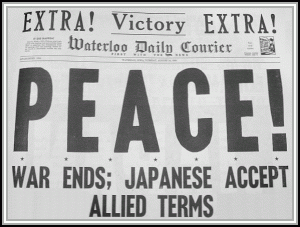I want to extract a lesson from history today. I’m going to use an example taken from the strategy of the Japanese military in World War II to make my point, but I assume all my readers are savvy enough to know that this is not criticism of contemporary Japan.
My father was not a career military man, but his ashes (along with those of my mother) are interred at the columbarium of Arlington National Cemetery because of his service in the Pacific theater during World War II. It is perhaps because of him that I was a bit of a WWII buff as a kid. But one question always really puzzled me. Why did Japan attack the US?
The question may not seem to need a complicated answer. At that time, Japan was a militaristic and imperialistic state, which had already invaded China. But their resources were already spread fairly thin. Why widen the war to include the US? To be sure, there were a few people at the time who sincerely believed that it was Japan’s destiny to rule both sides of the Pacific, and that they would be able to invade North America or at least get the US to become a vassal state. (Several islands in Alaska were in fact occupied by Japan during the war.) However, this was a vision largely confined to a handful of crazies. Sensible strategists realized that it was a fantasy to think the Japan could successfully launch an amphibious landing force across the Pacific. (All the resources of the US and Great Britain could barely do it across the English Channel.)
Other strategists had a much more moderate goal. Franklin Roosevelt was using his executive powers as President to try to curb Japanese militarism in Asia. After the Japanese invaded French Indo-China (Vietnam), Roosevelt had blocked the sale of oil to Japan. Some Japanese leaders thought that if they launched a preemptive strike against Pearl Harbor (ideally wiping out the US carrier fleet), the US would be so demoralized that it would agree to reverse Roosevelt’s restrictive policies against Japan, and give diplomatic recognition to Japan’s occupation of China. Obviously, this was a serious miscalculation on their part.
My father’s attitude was representative of that of many Americans at the time. Most people prior to Pearl Harbor, while disapproving of Japanese and German aggression, were not at all enthusiastic about the prospect of the US becoming involved in either war. However, the attack on Pearl Harbor galvanized US public opinion against Japan, and made a generation of people positively eager to fight. The US prior to Pearl Harbor was an inconvenience to the Japanese military. After Pearl Harbor, it was a juggernaut that would inevitably destroy it.
I promised a moral to learn from this history lesson. What is it? Don’t mess with the US? Well, that too. We are a great country, and for all our faults and divisions, we come together when we are attacked, and the results are genuinely awe-inspiring. But I want to suggest a more subtle, and more controversial, lesson.The strategy of the Japanese militarists was getting the US to back down by bombing us, and we roll our eyes at their naiveté. Why would you think that attacking us would make us less likely to fight? But the same is true of other countries, and other peoples, around the world. The lesson to learn is this: the use of force against people makes them hate you, if they did not, or hate you more, if they already hated you a little. It unites people who would otherwise have fought each other to fight against you. It destroys whatever pockets of political moderation there might have been among those people.
Of course, the US did win the war against Japan, Germany, and Italy through force. But through the Marshall Plan in Europe and MacArthur’s leadership in Japan, we made sure that these countries maintained their original territorial integrity, and had a chance to rebuild with a better life and democratic institutions. Had we left them smoldering in their ashes, or seized one of the Japanese home islands, who knows what monster would have grown there. (Don’t forget that Hitler came to power in large part because the Treaty of Versailles humiliated and crippled Germany, and Japanese militarism grew after Commodore Perry showed up in Tokyo Bay, demanding a trade agreement, and blew up a few warehouses just to show he meant business.)
When you are shoved, it is natural to shove back. Sometimes, though, even when you are much stronger, it is better to respond differently: not because you are weak, not because you are a coward, and not because you are naive. Sometimes the most hard-headed strategy is peace and reconciliation.

